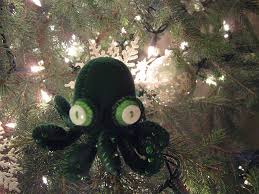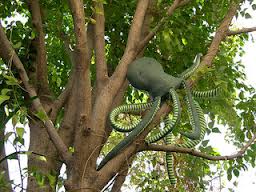| just two photos of the northwest tree octopus in the wild Harold Rheingold's book and website, both called Netsmart have great resources about "how to thrive online" and "what you need to know to use social media intelligently, humanely, and mindfully." | I am working once a week with a group of third graders on learning to use an iPad in an educational setting because next year they'll be part of a 1:1 iPad program. Since it seemed an opportune time to learn how to do some research, I suggested we learn about the Pacific Northwest Tree Octopus. For those of you who know this, I can hear you chuckling. For those of you who don't know about this, there is no such creature, but there IS a host of information about these nonexistent octopi on line. As the students spent twenty minutes or so doing research it was all I could do not to laugh out loud. At first, a few of the students were skeptical, which is not surprising seeing as some of the pictures are so obviously fake. But as they found more websites and watched videos, they lost their skepticism. Now this is just what can be dangerous about the internet. We need to help students develop what Harold Rheingold has termed "crap detectors." They have to be able to separate the useful information from the crap. After the kiddos shared their findings, I let them in on the joke. They weren't completely shocked, because of their initial skepticism, but they were taken aback. But this was all part of the plan. The subsequent discussion about verifying sources was powerful. Though we all had a good laugh, it was a serious lesson, and one that we all need to remember. Now the kids are asking for more lessons where they have to figure out if something is real or fake. Not only did they get the importance of the lesson, but they are asking for further chances to hone these skills. I love this! THIS is what this lesson was meant to do, create critical thinkers. |
|
0 Comments
|
Categories
All
Archives
July 2018
|


 RSS Feed
RSS Feed
